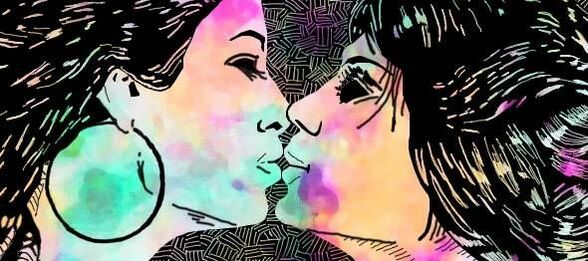Kate Norquay
Summer Camps is performed at the Innermost gardens, a beautiful space on Mount Victoria. As the audience arrives, the performers mingle with us, playing frisbee and offering essential oils. It’s a lovely way to set the tone and put the audience at ease. The play is presented by promenade, and the audience timidly follow the actors like it’s their first day at camp.
First we are divided into groups, depending on the colours of our summer camp wristbands. One actor takes each group away and shares their queer self discovery story. We only get to hear from one actor, and the stories shared with the other groups remain a mystery to us. In such a small group we were able to connect with the actor with a deep intimacy. It was a privilege to hear such a cherished story, that was private to just our purple wrist-banded group. I imagine this is what it was like at summer camp. Little moments of connection springing up in small groups, with everyone taking something different away from their experience. I did find myself wish that there were more of these personal moments throughout the rest of the show.
Performers, Alayne Dick, Annica Lewis, Courtney Rose Brown and Jessica Green are able to switch seamlessly between performing as themselves, and as the women who attended the camps. Changes in costume, and subtleties in vocal tone and physicality were executed flawlessly, and I never felt confused about which character I was listening to.
Tonally, Summer Camps has a difficult line to walk. It wants to tell the stories of our lesbian elders in a respectful way, that captures the whimsy and joyfulness of those early camps. It also wants to bring something new to the conversation and challenge others, through the performers telling their own experiences of queer womanhood. It wants to be a safe space, where everyone has a chance to share without exclusion or ridicule.
For the most part, it does this successfully. The show really does feel like being at camp. While listening to the words of our lesbian elders, we sit on cushions under a blanket fort, share cups of tea and vegetarian snacks, and lead each other blindfolded around the space. Performing as themselves, the actors discuss issues relevant to queer women today, such as the exclusion of trans women, and ‘women’s only’ spaces.
I would have liked to see more of the messiness and conflict of the summer camps reflected in the direction of the performance. We learn that the camps were shut down, partially because of the in group fighting that happened when a woman who was suspected to be bisexual attended. I wondered what the atmosphere at that camp was like. I wanted to see the tone of the show change from one of relaxation and silliness, to tension and anger.
Summer Camps is a brave and intelligent show, that I grow to appreciate more the more I think about it. Near the end of the show, Brown talks about how easy it is to stay in our own liberal bubbles and block out those who don’t agree with us. She argues that it is our responsibility to be better than that, and to seek out those difficult conversations. Summer Camps does just that, by connecting us with queer perspectives, some of which are considered unpopular, or even unjust in 2019, but don’t deserve to be lost from history.
Summer Camps is showing at the Innermost gardens from the 21st-23rd of March. It is part of the Wellington NZ Fringe Arts Festival. To book tickets, visit the Fringe Festival website.






